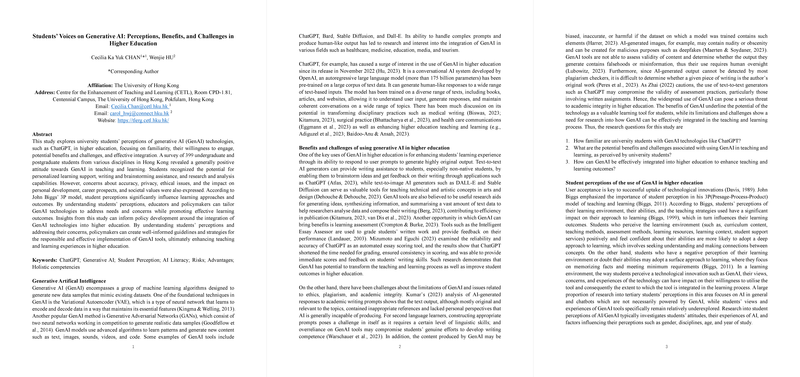Insights on Students' Perceptions of Generative AI in Higher Education
The timely paper by Chan and Hu offers an exploration into the stance of university students regarding the incorporation of generative AI (GenAI) in higher education. By examining the perceptions of 399 undergraduate and postgraduate students from a variety of disciplines in Hong Kong, the paper illuminates both the enthusiasms and reservations that GenAI invokes in this academic domain.
Key Findings
A fundamental aspect of the research is the delineation of students' positive attitude toward GenAI technologies such as ChatGPT. The participants acknowledged notable benefits, including GenAI’s capability for providing personalized learning support and facilitating research through synthesizing information. Additionally, GenAI’s potential in research analysis, idea generation, and expedited learning assessments was recognized, demonstrating its capacity to enhance educational efficiency and student outcomes.
Nonetheless, the paper does not shy away from addressing the significant challenges GenAI presents. Concerns regarding the accuracy and reliability of AI-generated content were prevalent. Furthermore, issues related to privacy breaches, potential biases, and ethical considerations, including the risks of plagiarism, were prominent. The paper highlights concerns about GenAI’s impact on student personal development and societal values, addressing fears that its integration may hinder critical skills and career prospects.
Methodology
The research adopts a mixed methodology, using both quantitative and qualitative analyses to evaluate survey responses. A correlational analysis revealed that students' willingness to use GenAI is positively associated with their knowledge and frequency of use, suggesting familiarity breeds acceptance. Thematic analysis of open-ended responses provided insights into both the attracted enthusiasm towards the technology and the foundational concerns students harbor.
Implications and Recommendations
The implications of Chan and Hu's findings suggest that educators and policymakers should focus on educating students about GenAI's practical capabilities and ethical use to foster responsible application. A deeper understanding of students’ perceptions can aid in designing AI literacy curricula, thus ensuring students’ proficiency with these technologies in their future careers.
Moreover, the paper emphasizes the need for policies that ensure transparency in AI systems to mitigate misuse and build trust in GenAI technologies. Institutions should also consider curricular reforms that integrate GenAI as a supportive educational tool while preserving the integrity of traditional pedagogic practices.
Conclusion and Further Research
The research presented signifies a thoughtful analysis of GenAI in educational settings, capturing a nuanced discourse on its perceived benefits and the complex challenges it introduces. The demonstrated correlation between students’ experiences with GenAI and their readiness to embrace it, juxtaposed with their ethical and practical concerns, underscores the multifaceted nature of integrating such technologies in academia.
Further research is warranted to explore long-term impacts of GenAI utilization on both learning outcomes and broader educational dynamics. Expanding the sample size and including diverse educational contexts may afford more generalizable insights. Future studies should consider longitudinal designs to track changes in perceptions as GenAI technologies evolve.
In conclusion, Chan and Hu’s investigation offers a significant contribution to understanding how generative AI is viewed within the academic community, paving the way for more informed and balanced integration strategies in higher education.
